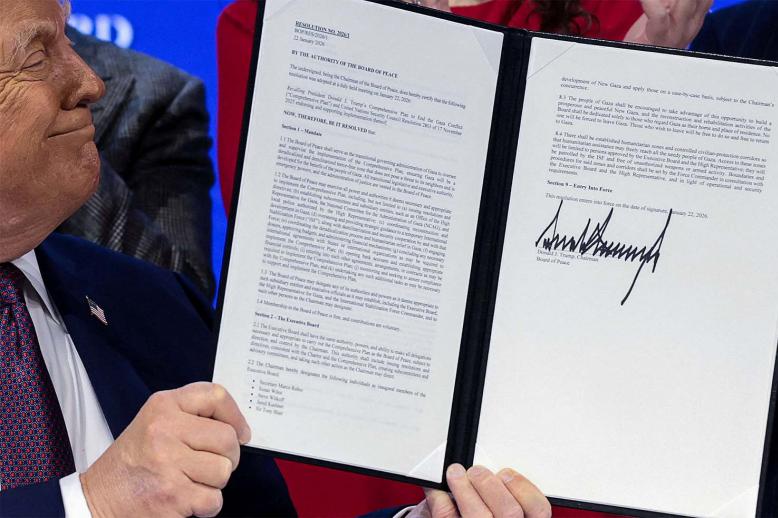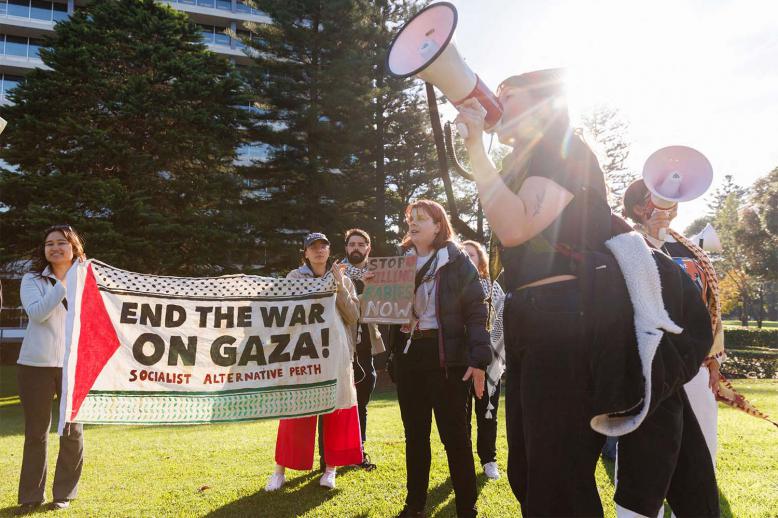Algeria’s generals fail to see turmoil’s toll on economy
The international trade fair of Algiers has, for decades, been one of the most important dates on the country’s economic calendar. The rise or fall of the number of domestic and international companies present offers a good barometer of the state of the economy. The sharp decline in the number of foreign and national companies this year, let alone a sharp drop in the number of visitors, bore witness to the growing economic cost of General Ahmed Gaid Salah’s refusal to countenance a credible transition towards free and fair elections.
Algeria’s economy has become one of the major collateral victims of the witch hunt initiated by the army high command, which has put behind bars, in the most arbitrary fashion, hundreds of private entrepreneurs and senior civil servants.
All state investment is currently frozen, as is attribution of land for industrial projects, while advertising campaigns are put off. This is all the more notable because the month of Ramadan is usually favoured to launch new consumer products. It is impossible to hazard what the loss of GDP growth and consequently jobs might amount to so far. The economy is exacting its revenge on politics, as symbolised by a group of economically illiterate army officers.
On June 10, the umbrella professional organisation for companies in the building sector, the General Association of Algerian Entrepreneurs (AGEA), drew the attention of interim Prime Minister Noureddine Bedoui to the closure of 3,200 companies in its sector since last December and the resulting loss of 265,000 jobs. Many other sectors that are dependent on imports were already suffering from government’s 2017 decision to rein them in, after the price of oil was more than halved between 2014 and 2016. The sharp slowdown in economic output is hitting all sectors, from white goods to electronics, car assembly plants, farming machinery and pharmaceuticals.
The sheer complexity of the system of import control put in place since 2017 has encouraged opacity and corruption, all too often to the benefit of those close to the former presidential clan. Many of its members are under house arrest or in pre-trial detention following the corruption clean-up campaign launched three months ago but many others who are bone fide entrepreneurs and not linked to former President Abdelaziz Bouteflika have been caught up in the alleged clean-up. Names are often leaked to the media before the “culprits” are arrested, which violates existing laws. Arbitrary practices are the name of the game.
On June 23, the prime minister set up an ad hoc commission, under the authority of the minister of finance to help preserve the interests (and jobs) of companies whose owner had been put under lock and key. Private entrepreneurs view the prime minister’s publicly stated concern with utter contempt as he has no say in who is arrested. The economy was already slowing before the demonstrations started but whole sectors risk being destroyed if the current wave of arrests continue. They include those who own the most important car assembly plants: Mahieddine Tahkout, who owns CIMA Motors (Hyundai), Mourad Oulmi who owns SOVAC (VW, SEAT, SCODA), Hassan Larbaoui who owns GLOVIZ (KIA) and Kamel Kherbouche (Tracteurs Deutz). They employ 100,000 people.
In the state sector, the CEO of the Banque Nationale d’Algérie who is also president of the bankers association (ABEF) and the former CEO of the Crédit Populaire d’Algérie are under lock and key. The Ministry of Industry has seen four secretary-generals come and go in three months and a number of its senior staff have been arrested or forced into early retirement. The senior civil service is living in fear of what comes next and sitting on its hands. Not only is Algeria’s international reputation being severely damaged but its capacity to attract foreign investors destroyed.
Those businessmen arrested are a mixed bunch. Ali Haddad, the former head of the employers’ federation (FCE) was a member of the presidential circle. His private companies in the construction sector were viewed among bona fide entrepreneurs as little more than scams. Issad Rebrab, on the other hand, has created dozens of companies, in Algeria, Europe and Africa and employs an estimated 13,000 people. He is a businessman of repute with a clear strategy of international expansion. His imprisonment probably owes more to his alleged links with the former head of security, General Mohamed Mediene who is Gaid Salah’s bete noire and now languishes in jail.
The campaign to clean up corruption looks increasingly like the settling of scores in the deep state. If it continues it spells disaster.The failure of successive governments to diversify away from the country’s quasi exclusive reliance of oil and gas exports (98% of foreign income today, a figure unchanged from the 1970s), to allow private entrepreneurs the freedom to set up joint ventures between Algerian and foreign firms on terms that are internationally acceptable has seriously weakened the economy.
No better symbol illustrates the incapacity of senior generals to understand the huge damage they are inflicting on the economy than what is happening in the oil and gas sector. Following the dismissal of the former head of Sonatrach, Abdelmoumen Ould Kaddour, in April, the interim stewardship of the company has been entrusted to Rachid Hachichi, who is a competent head of the oil production unit but out of his depth as head of an international company where strategic decisions need to be made on a daily basis. Sonatrach cannot be run on an “interim” basis without inflicted lasting damage on its reputation.
According to Rachid Sekak, a respected banker and economist, the myriad risks the current uncertainty entails include delayed payments, banks afraid to take any decisions, quantitative restrictions on imports, a devaluation of the dinar, an increase in inflation, a marked increase in unemployment with all that entails in terms of social tensions and a fall in hard currency reserves, which have halved to $79.9 billion between the end of 2014 and the end of 2018. Furthermore, the massive “checking” of tax returns of businessmen by the ministry of finance underway suggests a witch hunt. The economic illiteracy of Gaid Salah offers a textbook case of how best to damage Algeria’s economy.
Francis Ghiles is an associate fellow at the Barcelona Centre for International Affairs.
This article was originally published in The Arab Weekly.







